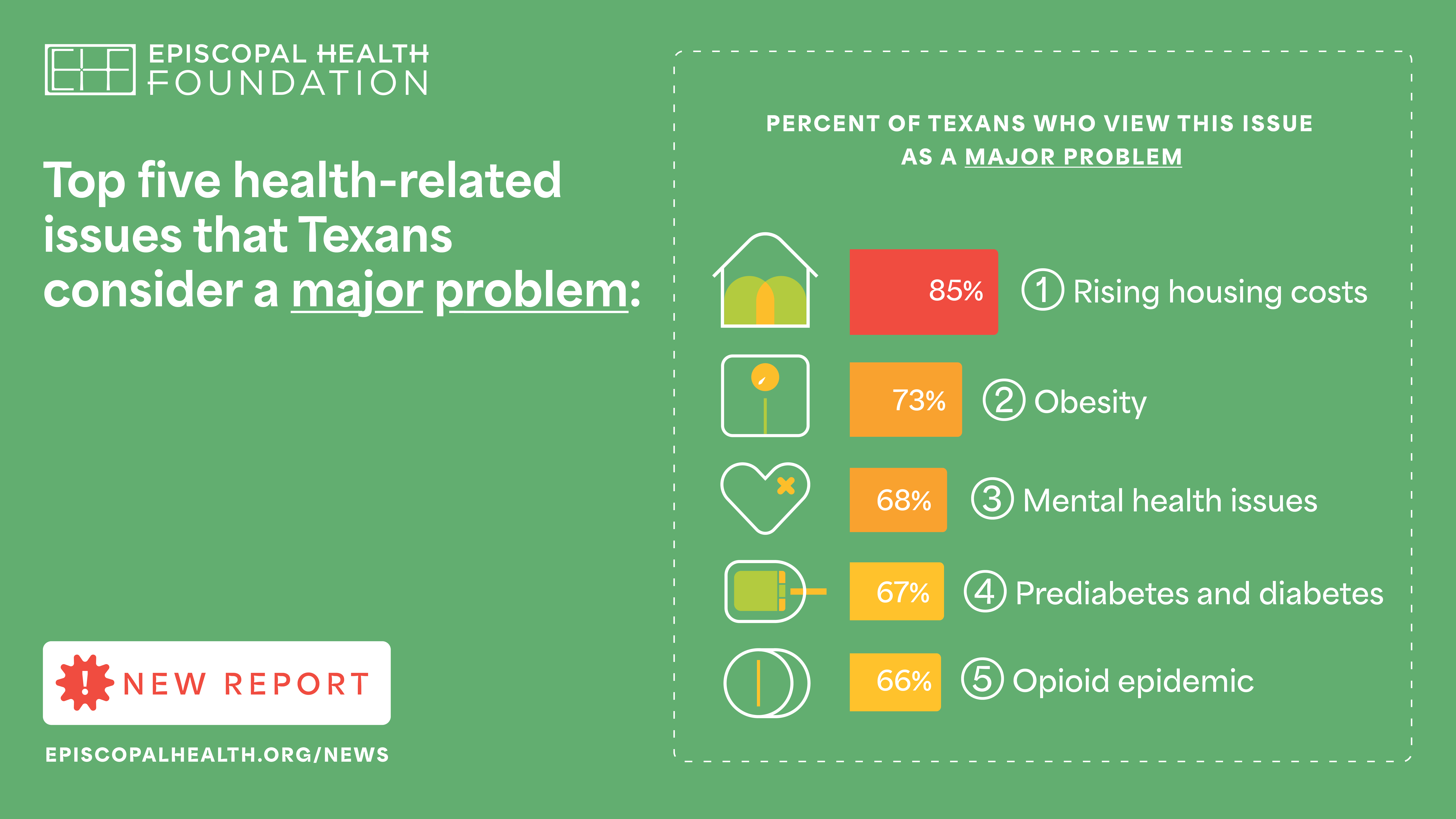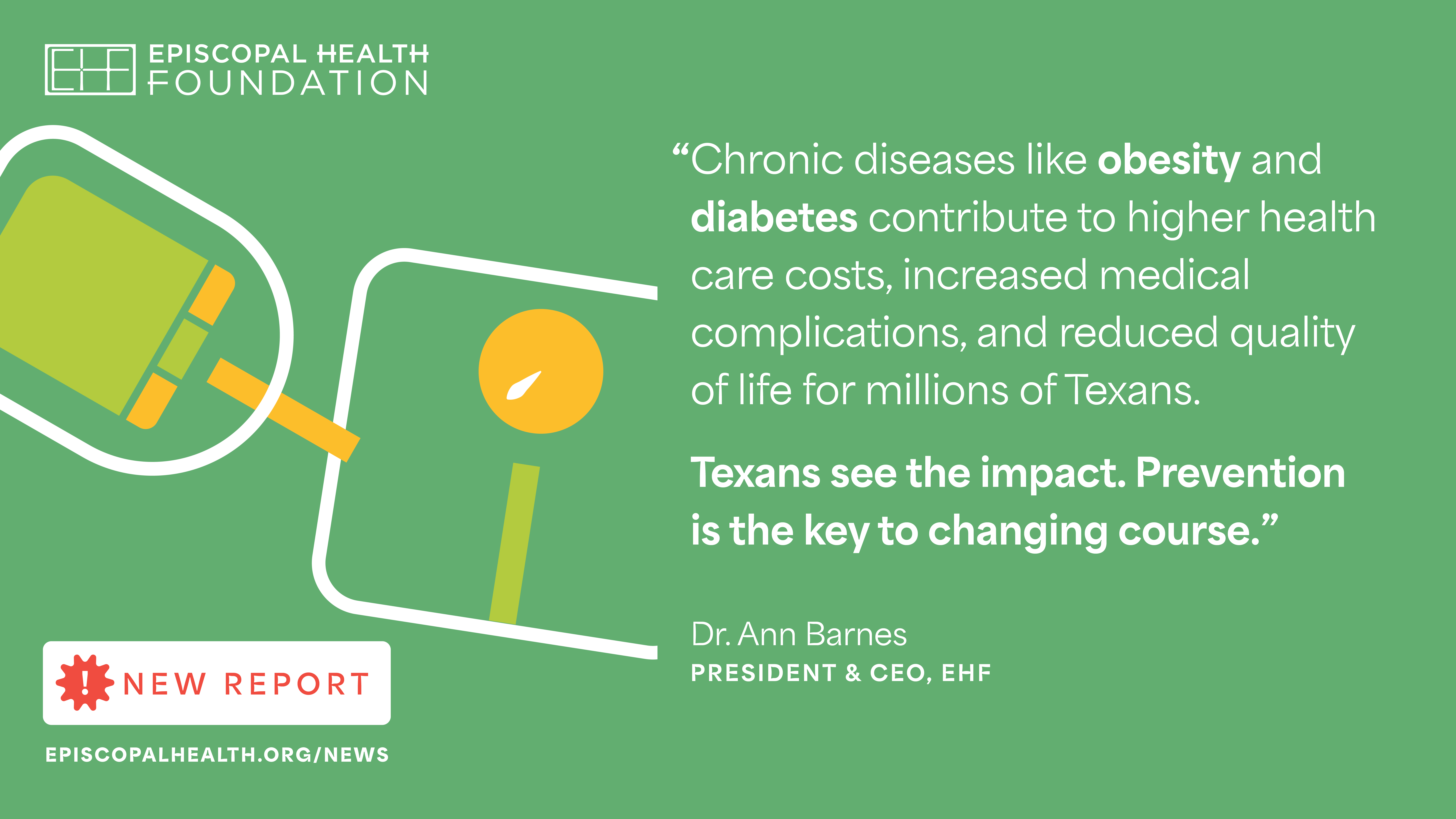Key Findings include:
Diabetes, obesity among Texans’ top health-related problems
63% of Texans say they skipped health care due to cost
46% say it’s difficult to afford health care
41% say they had difficulty paying medical bills
94% say that their communities lack at least one non-medical resource that impacts health
70% see opportunities for the state to enhance health care access for low-income residents
69% have a favorable view of Medicaid in Texas
Obesity and diabetes are among major health-related problems
EHF’s poll shows that Texans see obesity and diabetes as two of the state’s most pressing health issues. Almost three-quarters of Texans (73%) named obesity as a major health-related problem in the state and 67% say diabetes and pre-diabetes are major concerns.
“Chronic diseases like obesity and diabetes contribute to higher health care costs, increased medical complications, and reduced quality of life for millions of Texans,” says Dr. Ann Barnes, EHF’s president and CEO. “Texans see the impact. Prevention is the key to changing course.”
Barnes says the poll results should be a call to action in Texas. She says potential solutions include prioritizing routine diabetes risk screenings, expanding affordable preventive care, and addressing underlying non-medical causes of obesity and diabetes like limited healthy food options and lack of safe places for physical activity.
“A bold strategy for prevention reduces rates of diabetes and obesity, and it will save the state billions of dollars in health care costs,” Barnes says.
A recent analysis by Milliman commissioned by EHF estimates that diabetes-related health care costs contribute between $6 billion and $8 billion annually to Medicaid in Texas, accounting for as much as 30% of the program’s total spending for adults.
Texans also named rising housing costs (85%), mental health issues (68%), and the opioid epidemic (66%) as major health-related problems for the state.
Texans skip care due to costs, have trouble affording health care
EHF’s poll found that 63% of Texans said they skipped or postponed some sort of health care because of cost in the past year. That includes screenings, check-ups, treatments, tests, filling prescriptions, and dental care.
Almost half of Texans (46%) say it’s difficult for them to afford health care. Researchers found that almost two-thirds of low-income Texans (61%) said they had struggles affording health care compared to 27% of higher earners. In addition, younger Texans (49%) were much more likely to struggle affording care compared to Texans over age 65 (31%).
When Texans were able to access health care, EHF’s poll shows that four in 10 Texans (41%) say they had difficulty paying their medical bills. Researchers found that younger adults, Black and Hispanic adults, and those with lower incomes are more likely to say they have had trouble affording medical bills compared to their counterparts.
“It’s really concerning that these affordability struggles have not improved—in fact, they’ve stayed the same or even gotten worse over the seven years we’ve done this poll,” says Barnes
Texans recognize that non-medical factors directly impact health
A majority of Texans (94%) say their communities lack at least one key non-medical resource that affects health, with affordable housing (75%), well-paying jobs (69%), and public transportation (61%) topping the list.
Public transportation emerged as a significant concern, particularly for rural residents where access to reliable transit options is more limited. More than one third of Texans (35%) say they have difficulty reaching medical facilities such as hospitals, clinics, and pharmacies.
When it comes to solutions to address non-medical factors for those facing the most barriers to good health, 70% of Texans said it was “extremely important” or “very important” for Texas Medicaid to address non-medical drivers of health.
Texans support efforts to improve access for those struggling to access and afford health care
The poll shows that many Texans see opportunities for the state to do more to support Texans’ ability to access and afford care. In the poll, 70% say there is room to expand efforts to help low-income adults get the health care they need. Similarly, 58% think that more can be done to improve health care access for children, and 53% feel there’s an opportunity to better support pregnant women.
In addition, almost seven out of 10 Texans (69%) say they have a favorable view of Medicaid – the state’s safety-net program for low-income children, pregnant women, people with disabilities, and seniors in nursing homes in Texas.
Some Texans don’t have a primary care physician or usual place for care
Researchers found that 14% of Texans say they don’t have a usual source of care – meaning they don’t have a primary care provider, or they just go to the emergency room for routine care. Texans without health insurance (38%) and those with lower incomes (21%) are much more likely to say they don’t have a usual place to get health care.
Methodology
SSRS conducted the latest Texas Health Tracking Survey on behalf of Episcopal Health Foundation from November 11 through December 20, 2024. Similar polls have been conducted on behalf of EHF since 2018. The latest survey was conducted online and by telephone with a representative sample of 2,008 Texas adults (age 18 or older). The sample includes 896 Texas adults reached through the SSRS Opinion Panel online and by phone. The margin of sampling error for this study is +/- 3 percentage points for results based on the total sample.



